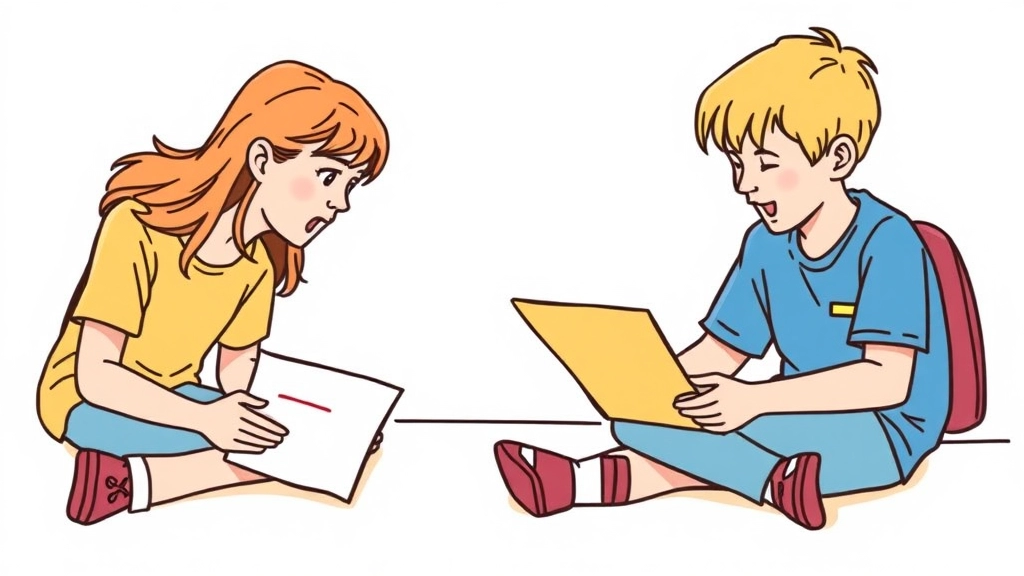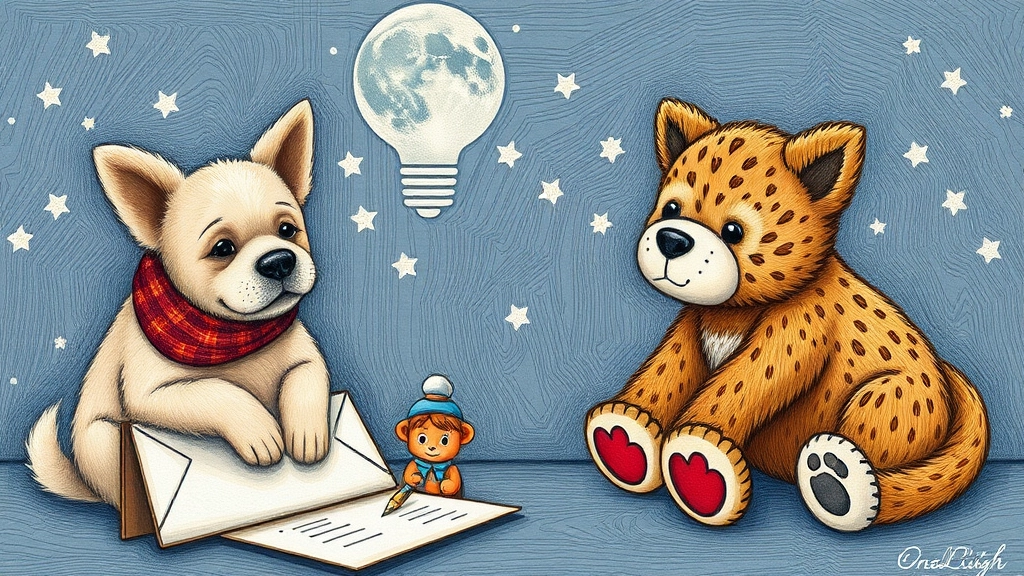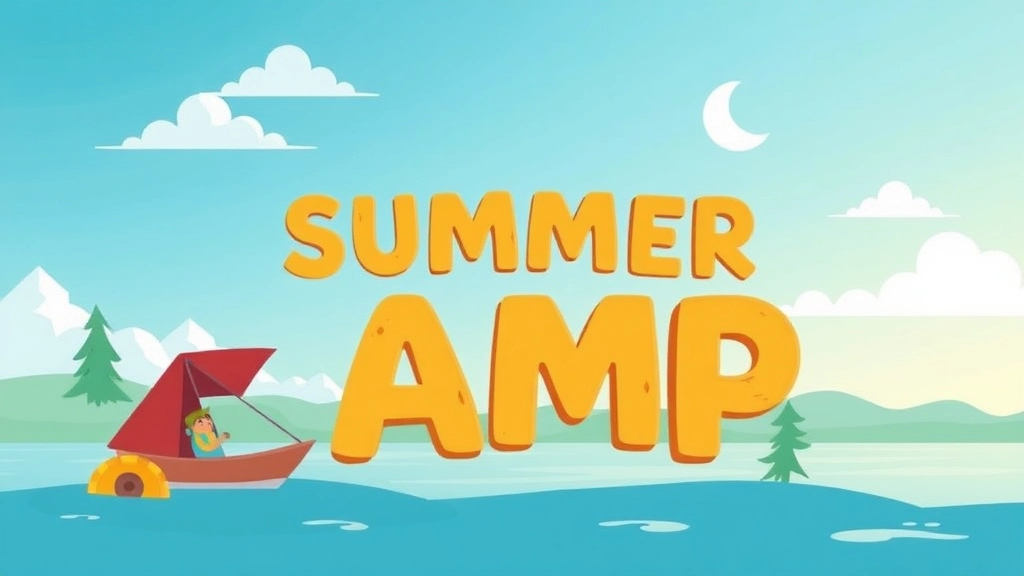Crafting the Perfect Summer Camp Letter
Ever wondered how to craft the perfect summer camp letter that not only keeps your camper engaged but also strengthens your bond? You’re not alone. Many parents face this challenge, and it’s completely normal. This article is your ultimate guide to mastering the art of summer camp letters, covering everything from creative ideas to best practices for regular communication and the emotional impact on your child.
Tips for Writing the Perfect Summer Camp Letter
We’ll explore tips for writing the perfect summer camp letter, what to avoid, and how to infuse humor and fun elements like riddles and games. You’ll learn the best practices for maintaining regular communication, the emotional significance of these letters, and how to encourage responses from your camper.
Creative Formats
Plus, we’ve got creative formats like origami and art, and even sample letters to get you started. So, let’s dive in and make your letters the highlight of your camper’s day!
Tips for Writing the Perfect Summer Camp Letter
Ever wondered how to write the perfect summer camp letter? You’re not alone. Many parents struggle with this, and it’s totally normal. So, let’s dive in and make sure your letter hits the mark.
Why is it important? Because your letter is the lifeline to your child while they’re away. It’s a mix of encouragement, love, and a slice of home.
Start With a Warm Greeting
- Personal Touch: Use their nickname or a special greeting you always use.
- Example: “Hey Champ!” or “Hello Sunshine!”
Share Exciting News from Home
- Keep it Light: Talk about family updates, pets, or even neighbourhood gossip.
- Example: “Guess what? Your dog Buddy learned a new trick!”
Ask Open-Ended Questions
- Engage Them: Questions like “What’s the best thing you’ve done so far?” or “Any new friends?”
- Avoid Yes/No Questions: This encourages more elaborate responses.
Keep It Positive
- Encouraging Words: Let them know you’re proud of them.
- Example: “I’m so proud of you for trying new things!”
Include Fun Stories or Jokes
- Entertainment: Share a funny story or a joke.
- Example: “Why did the scarecrow win an award? Because he was outstanding in his field!”
Add a Personal Touch
- Handwritten Notes: If possible, handwrite the letter.
- Drawings and Doodles: Add some fun sketches or stickers.
Close with Love and Encouragement
- Warm Goodbye: Use phrases like “Miss you tons!” or “Can’t wait to hear all about your adventures!”
- Encouragement: “Keep having fun and trying new things!”
Remember, your letter is a slice of home. It should be comforting, engaging, and fun. So, get writing and make your camper’s day!
For more tips on making your child’s camp experience memorable, check out our Top 10 Exciting Summer Camp Activities and explore our guide on Summer Camp Decoration Ideas for a Fun Vibe.
What to Avoid When Writing a Letter to Your Camper

Ever worried about what not to say in a letter to your camper?
You’re not alone.
Let’s dive in and make sure your letters hit the mark without causing any unintended stress or homesickness.
Avoid Overloading with News from Home
First things first, don’t bombard them with too much news from home.
Why?
- It can make them feel like they’re missing out.
- They might get homesick.
Instead, keep it light and breezy.
Steer Clear of Negative Emotions
Don’t share your worries or sadness about missing them.
Here’s why:
- It may make them feel guilty or anxious.
- They might start to worry about you instead of enjoying camp.
No Comparisons, Please
Avoid comparing their camp experience to anything else.
Examples:
- “Your brother had so much fun at camp last year!”
- “I hope you’re making friends like you did at school.”
Why avoid this?
- Everyone’s experience is unique.
- Comparisons can create unnecessary pressure.
Stay Away from Overly Detailed Questions
Don’t ask too many specific questions like:
- “Did you win the soccer match?”
- “Did you make a new best friend?”
Reason:
- It can make them feel like they need to meet certain expectations.
- They might feel pressured to give the ‘right’ answers.
Don’t Promise Things You Can’t Deliver
Avoid making promises about what you’ll do once they’re back.
Why?
- Plans can change.
- It sets up expectations that might not be met.
Keep It Positive and Encouraging
Don’t dwell on any potential problems they might face.
For example:
- “I hope you’re not afraid of the dark.”
- “I know you don’t like bugs, but try to have fun.”
Why this matters:
- It can plant negative thoughts in their mind.
- They might start to focus on potential issues rather than enjoying themselves.
Avoid Too Much Focus on Technology
Don’t talk about all the tech stuff they’re missing out on.
Examples:
- “We got a new video game!”
- “You should see the latest episode of your favourite show!”
Reason:
- It can make them feel disconnected.
- They might miss home more.
Keep It Real, Keep It Light
Remember, the goal is to keep your letters engaging and positive.
Quick Recap:
- Avoid overloading with news from home.
- Steer clear of negative emotions.
- No comparisons.
- Stay away from overly detailed questions.
- Don’t promise things you can’t deliver.
- Keep it positive and encouraging.
- Avoid too much focus on technology.
By sticking to these tips, you’ll ensure your camper feels supported, happy, and ready to make the most of their summer camp experience.
Got any stories or examples?
Share them like you’re chatting with a mate over coffee.
Keep it real, keep it fresh, and keep your camper smiling.
Fun and Creative Ideas for Camp Letters
Alright, let’s dive into some fun and creative ideas for camp letters. I get it, you want to keep your camper engaged and excited about receiving mail. So, let’s break it down into simple, actionable tips that will make your letters the highlight of their day.
Start with a Bang: Personalised Openings
Keyword: Fun and Creative Ideas for Camp Letters
Ever wondered how to grab your camper’s attention right from the start? Personalised openings can do the trick. Here are a few ideas:
- Use Nicknames: Start with a fun nickname or a special greeting only you two share.
- Photos and Drawings: Include a small doodle or a photo that reminds them of home.
- Inside Jokes: Kick off with an inside joke that only the two of you understand.
Interactive Elements: Keep Them Engaged
Internal Linking Opportunity: Incorporating Riddles, Puzzles, and Games in Your Letters
Interactive elements can make your letters more engaging. Think about:
- Riddles and Puzzles: Add a riddle or a simple puzzle for them to solve.
- Scavenger Hunts: Create a mini scavenger hunt with clues hidden in your letters.
- Quizzes: Include a fun quiz about their favourite activities or camp experiences.
Story Time: Share Short Stories
Keyword: Fun and Creative Ideas for Camp Letters
Kids love stories, especially ones that are relatable and fun. Share short stories about:
- Home Adventures: What’s been happening at home? Any funny incidents with the family pet?
- Your Own Camp Memories: If you’ve got some camp stories from back in the day, share them!
- Fictional Fun: Make up a short, silly story involving their favourite characters or toys.
Visual Elements: Add Some Flair
Internal Linking Opportunity: Creative Letter Formats: Origami, Art, and More
Visual elements can make your letters pop. Consider:
- Origami: Fold your letter into a fun shape.
- Stickers and Doodles: Decorate the letter with stickers or little doodles.
- Coloured Paper: Write on coloured or patterned paper to make it stand out.
Encouragement and Positivity
Internal Linking Opportunity: How to Balance Encouragement and Independence in Letters
Your camper might have moments of homesickness or self-doubt. Use your letters to:
- Offer Encouragement: Remind them of their strengths and how proud you are.
- Promote Independence: Encourage them to try new activities and make new friends.
- Positive Affirmations: Include a positive affirmation or motivational quote.
Call to Action: Get a Response
Internal Linking Opportunity: How to Encourage Responses from Your Camper
Want to hear back from your camper? Make it easy for them:
- Ask Questions: Pose simple questions about their day or activities.
- Include a Self-Addressed Envelope: Make it super easy for them to reply.
- Challenge Them: Challenge them to write back with a fun fact or a new joke.
Real-Life Examples: Bringing It All Together
Keyword: Fun and Creative Ideas for Camp Letters
Here’s a quick example to illustrate these tips:
Hey Champ,
(Personalised Opening)
How’s my favourite adventurer doing? Remember that time we built a fort in the living room and pretended it was a spaceship? I bet you’re having even more fun at camp!
(Interactive Element)
Here’s a riddle for you: What has keys but can’t open locks? (Answer it in your next letter!)
(Story Time)
Guess what? Max (our dog) tried to chase a squirrel yesterday and ended up falling into the kiddie pool. He looked so funny, all wet and confused!
(Visual Element)
I’ve drawn a little doodle of Max in the pool on the back of this letter. Hope it makes you smile!
(Encouragement and Positivity)
I’m so proud of you for trying new things at camp. Remember, it’s okay to miss home, but you’re doing great and making awesome memories.
(Call to Action)
Can’t wait to hear all about your latest adventure. Write back soon and tell me about the coolest thing you’ve done so far!
Love,
Mum
How to Use Humor in Summer Camp Letters

Worried your camper might get homesick?
Wondering how to keep your letters light and fun?
Humour is your secret weapon.
Why Use Humour?
Humour can:
- Make your camper laugh
- Lighten their mood
- Create a sense of connection
How to Nail It:
1. Be Yourself:
Don’t try too hard. Kids can sniff out fake humour faster than a campfire marshmallow burns.
2. Inside Jokes:
Got a funny family story? Share it.
Inside jokes make your camper feel special.
3. Funny Stories:
Did the dog steal your sandwich?
Did Dad wear mismatched socks again?
Share these little moments. They’re gold.
4. Silly Questions:
Ask goofy questions like:
” If you could have any superpower, what would it be?”
“Would you rather fight one horse-sized duck or a hundred duck-sized horses?”
5. Puns and Wordplay:
They’re cheesy but effective.
“Why did the scarecrow win an award? Because he was outstanding in his field!”
6. Cartoons and Doodles:
Draw a funny picture or a comic strip.
Even if you’re no Picasso, your camper will love it.
Example Letter:
Hey [Camper’s Name],
Guess what? The dog tried to drive the car today.
He didn’t get very far, but it was hilarious!
How’s camp food? Better than Dad’s cooking, I bet!
Here’s a joke for you: Why don’t scientists trust atoms? Because they make up everything!
Love,
[Your Name]
Why It Works:
Relatable:
Your camper knows the dog.
They know Dad’s cooking.
Light-hearted:
Keeps the tone fun.
Engaging:
They’ll want to write back with their own jokes.
Avoid These Pitfalls:
Overdoing It:
Too many jokes can feel forced.
Sensitive Topics:
Avoid anything that might upset them.
Keep It Fresh:
- Mix up your humour.
- Use different styles.
- Keep it real.
Incorporating Riddles, Puzzles, and Games in Your Letters
Ever wonder how to keep your camper engaged and excited to read your letters? Incorporating riddles, puzzles, and games is a brilliant way to do just that. Think about it: kids love challenges and interactive fun. So, why not make their mail a bit more thrilling?
Why Add Riddles, Puzzles, and Games?
- Engagement: Kids are more likely to read and re-read letters that offer a bit of a challenge.
- Bonding: It creates a shared experience, even when you’re miles apart.
- Mental Stimulation: Keeps their brains active and entertained.
Types of Fun Activities to Include
- Riddles: Simple and fun. Here’s a classic: “What has keys but can’t open locks?” (Answer: A piano).
- Crossword Puzzles: Create a mini crossword related to camp activities or inside jokes.
- Word Searches: Use camp-related words to make it relevant and exciting.
- Jokes: A good laugh never hurt anyone. Include a joke or two to lighten their day.
- Scavenger Hunts: List items they might find around camp and challenge them to find as many as they can.
How to Include These in Your Letters
- Riddles at the End: Place a riddle at the end of your letter for them to solve before the next one arrives.
- Puzzle Inserts: Include a small crossword or word search on a separate piece of paper.
- Interactive Stories: Write a story but leave blanks for them to fill in, like a mad lib.
- Drawing Challenges: Ask them to draw something specific and send it back to you.
Personal Touches
- Custom Puzzles: Use an online tool to create a custom crossword or word search with their favourite things.
- Inside Jokes: Use personal jokes or family traditions to make it even more special.
- Hints and Clues: If you’re planning a surprise for when they get back, drop hints in each letter.
Real-Life Examples
I remember sending my niece a series of riddles in her camp letters. Each riddle led her to the next, and by the end of the camp, she had solved them all. The excitement in her letters back to me was priceless.
Or take a leaf from my book: I once sent my nephew a word search with all his favourite football players. He loved it so much that he kept it as a keepsake.
Keep It Simple
- Short and Sweet: Don’t overdo it. One or two activities per letter are enough.
- Age-Appropriate: Make sure the difficulty level matches their age and interests.
- Clear Instructions: Explain how to solve the puzzles or the rules of the game clearly.
For more ideas on keeping your camper engaged, check out our fun summer camp crafts for kids and our summer camp water games to keep the excitement flowing!
Best Practices for Regular Communication with Campers

Ever wondered how often you should write to your camper?
Or what to say to keep them engaged without being overbearing?
Let’s break it down.
How Often Should You Write?
Consistency is key.
But what’s the sweet spot?
Aim for 2-3 letters a week.
- Enough to show you care.
- Not so much that it feels like a chore for them.
What to Include in Your Letters
Keep it simple and engaging.
Here’s a quick checklist:
- Updates from home: Share funny stories or small updates.
- Encouragement: Boost their morale with positive words.
- Questions: Ask about their camp activities and new friends.
Avoid This Pitfall
Don’t make them homesick.
Avoid phrases like:
- “We miss you so much.”
- “Home isn’t the same without you.”
Use a Conversational Tone
Write like you’re chatting over coffee.
Example:
“Hey [Camper’s Name], guess what? Your dog tried to chase a squirrel today and ended up in the neighbour’s garden! How’s the campfire cooking going?”
Sprinkle in Some Fun
Make it interesting.
- Include jokes or riddles.
- Add a simple drawing or doodle.
Personal Touches Matter
Mention specific things about your camper.
Example:
“Remember how you love marshmallows? I tried making them at home, and let’s just say, they didn’t quite turn out like yours!”
Encourage Responses
Make it easy for them to write back.
- Include pre-addressed, stamped envelopes.
- Ask open-ended questions.
Example:
“What’s the coolest thing you’ve done so far? Write back and tell me all about it!”
Keep It Real
Be genuine.
Kids can sense fluff from a mile away.
The Emotional Impact of Summer Camp Letters on Children
Ever wondered why that simple piece of paper can make or break your kid’s day at camp? Let’s dive into the emotional impact of summer camp letters on children. Spoiler alert: It’s massive.
Why Do Letters Matter So Much?
Kids at camp are in a new environment, away from their comfort zone. It’s a thrilling adventure, but it can also be a bit daunting. Here’s why your letters can be a game-changer:
- Connection: Being away from home can make kids feel disconnected. A letter from you bridges that gap and reminds them they’re still connected to their family.
- Encouragement: Camp activities can be challenging. Your words can boost their confidence and motivate them to try new things.
- Emotional Support: Homesickness is real. A heartfelt letter can provide the emotional support they need to get through tough days.
What Do Kids Really Feel?
Let’s break it down. When kids receive a letter, they often feel:
- Loved and Valued: Knowing someone took the time to write makes them feel special.
- Excited: The anticipation of receiving a letter can be a highlight of their day.
- Reassured: Familiar words from home can be incredibly comforting.
Real Stories, Real Impact
Imagine this: Your child is struggling with a new activity at camp. They open your letter and read, “I know you can do it! Remember how you mastered riding your bike?” Suddenly, they’re not just a kid at camp; they’re a kid who can conquer challenges. That’s the power of your words.
Or consider the flip side: No letters at all. It can make a child feel forgotten or unimportant. That’s a heavy emotional toll for anyone, let alone a young camper.
Tips for Maximising Emotional Impact
Want to make your letters hit home? Here are some quick tips:
- Personal Touch: Mention specific things about their life or camp activities.
- Positive Reinforcement: Highlight their strengths and past achievements.
- Consistency: Regular letters create a steady emotional support system.
- Interactive Elements: Include small puzzles or riddles to make the letter more engaging.
The Long-Term Benefits
The emotional impact of summer camp letters doesn’t just stop when camp ends. These letters can:
- Build Resilience: Kids learn to cope with being away from home, knowing they have your support.
- Strengthen Bonds: Regular communication can deepen your relationship.
- Encourage Independence: Balancing encouragement with independence helps them grow.
For more thoughtful ideas on how to support your child during their camp experience, check out our Summer Camp Care Packages guide. And if you’re looking for ways to keep the connection alive through creative means, explore our suggestions for Top Summer Camp Greeting Cards.
Creative Letter Formats: Origami, Art, and More

Ever wonder how to make your summer camp letters stand out?
You want your camper to be excited when they see your letter, right?
Let’s talk about some creative formats that will make your letters unforgettable.
Origami Letters
Imagine your kiddo unfolding an origami swan to reveal your message.
Cool, right?
Here’s how you can do it:
- Choose simple origami designs: Think swans, hearts, or stars.
- Write your letter on the paper before folding: This ensures your message is clear.
- Include folding instructions: So your camper knows how to refold it.
Art-Infused Letters
Why not add a splash of colour?
A little art can go a long way:
- Doodle in the margins: Add some fun sketches or cartoons.
- Use coloured pens or pencils: Make your letter vibrant and eye-catching.
- Include a mini art project: Maybe a small colouring page or a connect-the-dots.
Interactive Letters
How about a letter that’s also a game?
Here’s how to make it interactive:
- Add a maze or crossword puzzle: Keep their minds engaged.
- Include a scavenger hunt list: Let them find items around camp and report back.
- Write in code: Use a simple cipher for them to decode your message.
Personalised Stationery
Make it personal and special:
- Create custom stationery: Use photos or designs that mean something to both of you.
- Add stickers or stamps: Make it visually appealing.
- Include a small gift: Maybe a pressed flower or a tiny charm.
Story Letters
Turn your letter into a story:
- Write a short story: Feature your camper as the hero.
- Add cliffhangers: Keep them excited for the next letter.
- Illustrate the story: Even stick figures can add a fun touch.
Folded Notes
Simple but fun:
- Tri-fold or accordion fold: Make the letter feel like a mini-book.
- Include secret compartments: Hide little notes or drawings inside.
Keep it Real, Keep it Fresh
Remember, the goal is to keep your camper excited and engaged.
Mix it up.
Try different formats.
And most importantly, have fun with it!
How to Encourage Responses from Your Camper
Ever sent a letter to your camper and felt like you were tossing messages into a black hole? You’re not alone. Getting a response from your camper can feel like trying to catch a greased pig. But don’t worry, I’ve got your back. Let’s dive into some practical ways to encourage your camper to write back.
Why Won’t My Camper Write Back?
First things first, let’s address the elephant in the room. Why isn’t your camper responding? Here are some common reasons:
- They’re too busy having fun: Summer camp is jam-packed with activities.
- They don’t know what to say: Kids might feel overwhelmed or unsure about what to write.
- They miss home but don’t want to admit it: Writing can sometimes bring up homesickness.
Make it Easy for Them
Simplify the process for your camper. Here’s how:
- Include pre-addressed, stamped envelopes: This removes the hassle of finding stamps and addresses.
- Provide writing prompts: Ask specific questions like, âWhat was the best thing you did today?â or âTell me about a new friend you made.â
- Send stationery and pens: Fun, colourful paper and cool pens can make writing more appealing.
Keep It Fun and Engaging
Turn letter-writing into a game:
- Ask for their opinion: Kids love to give their thoughts. Ask, âWhat’s the best food you’ve had so far?â or âIf you could change one thing about camp, what would it be?â
- Include a fill-in-the-blank section: This makes it easier and quicker for them to respond.
- Add a challenge: For example, âI bet you can’t draw a picture of your cabin in under two minutes!â
Share Stories and Examples
Make your letters relatable. Share a funny story from your own camp days or a silly joke. For example:
- Story: “When I was at camp, I once got lost on a nature hike and ended up finding the best hidden waterfall. Have you discovered any secret spots?”
- Joke: âWhy don’t you ever see elephants hiding in trees? Because they’re so good at it!â
Create a Sense of Urgency
Sometimes, campers need a little nudge:
- Set a deadline: âCan you write back before the weekend? I can’t wait to hear from you!â
- Offer a reward: âIf you write back, I’ll send you a surprise in my next letter!â
Use Technology Wisely
While traditional letters are great, don’t shy away from using tech:
- Email if allowed: Some camps allow emails that are printed out and delivered.
- Camp apps: Many camps have apps for parents and campers to communicate.
Emotional Connection
Show them you care and miss them, but also that you want them to enjoy their independence:
- Express your feelings: âI miss you, but I’m so happy you’re having fun!â
- Encourage independence: âI’m proud of you for trying new things and making new friends.â
Sample Letter Template
Here’s a quick template to get you started:
Hey [Camper's Name], I hope you're having an amazing time at camp! I miss you but I'm so excited to hear about all your adventures. What's the coolest thing you've done so far? Can you draw me a picture of your favourite activity? I bet you can't do it in under two minutes! I've been thinking about my own camp days and remembered the time I got lost on a hike and found a hidden waterfall. Have you discovered any secret spots? Remember, I'd love to hear from you. You can use the stamped envelope I sent. Write back soon! Love, [Your Name]
By making the process easy, fun, and engaging, you’ll increase the chances of getting a response from your camper. Remember, the goal is to keep it real, keep it fresh, and keep it engaging. You’ve got this!
Writing Letters from Pets, Toys, or Favourite Items

Ever thought about writing a letter from your camper’s favourite stuffed animal or pet?
Sounds fun, right?
Kids love receiving letters from their beloved toys or pets. It adds a magical touch to their camp experience.
Why Write from a Pet or Toy?
- Engagement: Kids are more likely to read and cherish letters from their favourite items.
- Creativity: It allows you to be playful and imaginative.
- Connection: Helps maintain a sense of home and familiarity.
How to Write a Letter from a Pet or Toy
- Choose the Character: Decide if the letter will be from a pet, toy, or another favourite item.
- Get into Character: Think about how this character would talk. Would they be cheeky, wise, or silly?
- Add Personal Touches: Mention things only the toy or pet would know.
- Include Drawings: A doodle or paw print can make the letter extra special.
Example Structure
- Greeting: “Woof! Hey there, buddy!”
- Updates: “I’ve been guarding your room, but it’s not the same without you.”
- Questions: “Have you made any new friends? Found any cool bugs?”
- Sign Off: “Can’t wait to snuggle when you get back. Paws and kisses, Rover.”
Real-World Example
Imagine your child’s stuffed rabbit, Mr. Fluffy, writing to them:
Hey [Camper’s Name],
It’s Mr. Fluffy here! Guess what? I tried hopping around like you do, but I mostly just fell over. I miss our bedtime stories. Have you found any good ones at camp?
Stay hoppy,
Mr. Fluffy
Tips for Success
- Keep it Short: Kids have short attention spans.
- Stay Positive: Focus on fun and exciting news.
- Be Consistent: If you start with a pet or toy, stick with it for continuity.
Balancing Encouragement and Independence
While it’s great to keep the letters light and fun, also sprinkle in some encouragement. Remind them how proud you are of their independence and adventures.
How to Balance Encouragement and Independence in Letters
Worried about striking the right balance between encouragement and independence in your letters to your camper? You’re not alone. It’s a common concern for many parents. You want to be supportive but not overbearing. Let’s break it down so you can nail it every time.
Why Balance is Key
First off, let’s talk about why this balance is crucial. When your child is away at summer camp, they’re learning to stand on their own two feet. Overloading them with advice or constant check-ins can make them feel smothered. On the flip side, too little communication can make them feel abandoned. So, how do you find that sweet spot?
Practical Tips for Encouraging Independence
- Keep It Positive, But Real
- Share your excitement about their adventures.
- Avoid overly sentimental language that might make them homesick.
- Use phrases like, “I can’t wait to hear all about your adventures!” instead of, “I miss you so much it hurts.”
- Ask Open-Ended Questions
- Encourage them to share their experiences and thoughts.
- Examples: “What’s the most fun activity you’ve done so far?” or “Have you made any new friends?”
- Celebrate Their Wins
- Acknowledge their accomplishments, big or small.
- “I’m so proud of you for trying out that new activity!”
- Empower Their Decisions
- Let them know you trust their judgment.
- Phrases like, “I know you’ll make the right choices,” go a long way.
Real-Life Example
When my nephew went to camp, I wrote, “I know you’re having a blast and making great choices. I’m proud of you for stepping out of your comfort zone. Can’t wait to hear all the cool stuff you’re learning!” This way, he felt supported but also empowered to make his own decisions.
Avoiding the Pitfalls
- Don’t Overload with Advice
- Too much advice can feel overwhelming.
- Stick to one or two key points if necessary.
- Avoid Negative Language
- Phrases like, “Don’t be scared,” or “I hope you’re not too lonely,” can have the opposite effect.
- Focus on the positives instead.
- Balance Frequency
- Write regularly but not daily.
- A couple of times a week is usually perfect.
Encouraging Independence While Staying Connected
- Short and Sweet
- Keep your letters concise and to the point.
- They’re busy having fun, after all.
- Include Fun Elements
- Add a riddle or a simple puzzle.
- Keeps the letter engaging and light-hearted.
- Share a Bit About Home
- Just a snippet so they feel connected without feeling like they’re missing out.
- “The garden is blooming, and the dog misses you!”
Balancing encouragement and independence in your letters is an art, but with these tips, you’ll be a pro in no time. Remember, your camper is growing and learning, and your support can make all the difference. So, keep it positive, keep it light, and most importantly, keep it real.
For more tips on how to enhance your child’s camp experience, check out our Essential Guidelines for Safety and learn about the Ultimate Guide to Summer Camp Bonfire Fun.
Sample Letters: Fun Examples to Send to Your Camper
Worried about what to write in your summer camp letter?
You’re not alone.
Many parents struggle with this.
But don’t fret.
I’ve got you covered with some cracking examples.
These letters will keep your camper smiling and engaged.
Example 1: The Classic
Hey [Camper’s Name],
How’s camp treating you?
We miss you loads here.
The house is too quiet without your laughter.
Dad tried to cook dinner last night â let’s just say, we ended up ordering pizza!
Have you made any new friends?
Can’t wait to hear all about your adventures.
Love,
Mum and Dad
Example 2: The Humorous One
Hi [Camper’s Name],
Guess what?
Your pet goldfish tried to take over the house.
I walked in, and there it was, trying to use the remote control!
Just kidding, but we all miss you terribly.
What’s the funniest thing that’s happened at camp so far?
Write back soon!
Hugs,
Mum
Example 3: The Puzzle Letter
Hey [Camper’s Name],
I’ve got a challenge for you.
Solve this riddle: I speak without a mouth and hear without ears. I have no body, but I come alive with the wind. What am I?
Can’t wait to see if you get it right!
By the way, your brother is convinced he’s a superhero now.
He’s been running around in your old cape.
Miss you tons!
Love,
Dad
Example 4: The Encouraging Note
Hi [Camper’s Name],
I hope you’re having the best time at camp.
Remember, it’s okay to feel homesick sometimes.
You’re doing something amazing and growing every day.
We’re so proud of you.
Keep having fun and making memories.
See you soon,
Mum and Dad
Example 5: The Pet’s Perspective
Woof Woof [Camper’s Name],
It’s me, [Pet’s Name]!
The humans are taking good care of me, but I miss our walks together.
I’ve been guarding your room and keeping your bed warm.
Can’t wait for you to come back and play fetch.
Bark soon!
Love,
[Pet’s Name]
Example 6: The Artistic Letter
Hey [Camper’s Name],
I drew you a picture of our garden.
Can you spot the hidden butterfly?
I’ve been practising my drawing skills while you’re away.
Hope you’re having a blast and maybe even making some art of your own.
Miss you,
Mum
Example 7: The Origami Surprise
Dear [Camper’s Name],
Enclosed is a little surprise â an origami crane I made just for you.
They say these cranes bring good luck.
Hope it brightens your day.
What’s the coolest thing you’ve done at camp so far?
Love,
Dad
These examples should give you a solid starting point.
Remember, it’s all about making your camper feel connected and loved.
So, pick one, or mix and match ideas to create your perfect summer camp letter.
Your camper will love hearing from you. For more ideas on fun camp activities, check out our Top Summer Camp Games and Activities Guide.
And if you’re looking for more ways to keep your camper entertained, don’t miss our Color Your Summer Camp Adventure: Free Printables.
FAQs on Writing Summer Camp Letters
What should I avoid when writing a letter to my camper?
When writing to your camper, avoid overloading them with news from home, sharing negative emotions, making comparisons, asking overly detailed questions, making promises you can’t keep, focusing too much on technology, and dwelling on potential problems they might face. Keep your letters light, positive, and encouraging.
How can I use humor effectively in my letters?
Humor can make your camper laugh and feel connected. Be yourself, use inside jokes, share funny stories, ask silly questions, use puns and wordplay, and include cartoons or doodles. Avoid overdoing it and steer clear of sensitive topics.
How often should I write to my camper?
Aim for 2-3 letters a week. This shows you care without overwhelming them. Consistency is key to maintaining engagement without making it feel like a chore.
What should I include in my letters?
Include updates from home, words of encouragement, and questions about their camp activities and new friends. Make sure to keep it simple and engaging.
How can I make my letters more creative?
Try using origami, adding art, making the letter interactive, using personalized stationery, writing story letters, and folding notes in unique ways. These creative touches can make your letters stand out and be more exciting for your camper.
Can I write letters from pets, toys, or favorite items?
Yes! Writing letters from your camper’s favorite stuffed animal or pet can add a magical touch. It keeps them engaged and maintains a sense of home and familiarity. Be playful, add personal touches, and include drawings or paw prints for extra fun.
What tone should I use in my letters?
Write in a conversational tone as if you’re chatting over coffee. Keep it real, light-hearted, and genuine. Kids can sense when something isn’t authentic, so be yourself.
How can I encourage my camper to write back?
Include pre-addressed, stamped envelopes and ask open-ended questions. Make it easy and fun for them to respond. For example, ask them to share the coolest thing they’ve done so far at camp.
What should I do if my camper is feeling homesick?
Focus on positive and encouraging messages. Avoid phrases that might make them feel more homesick, like “We miss you so much” or “Home isn’t the same without you.” Instead, boost their morale and remind them of the fun and exciting experiences they’re having at camp.
Any tips for balancing encouragement and independence in my letters?
While keeping the letters light and fun, also sprinkle in some encouragement. Remind your camper how proud you are of their independence and adventures. This balance helps them feel supported and confident.
References
-
What to Avoid When Writing a Letter to Your Camper
-
How to Use Humor in Summer Camp Letters
-
Best Practices for Regular Communication with Campers

